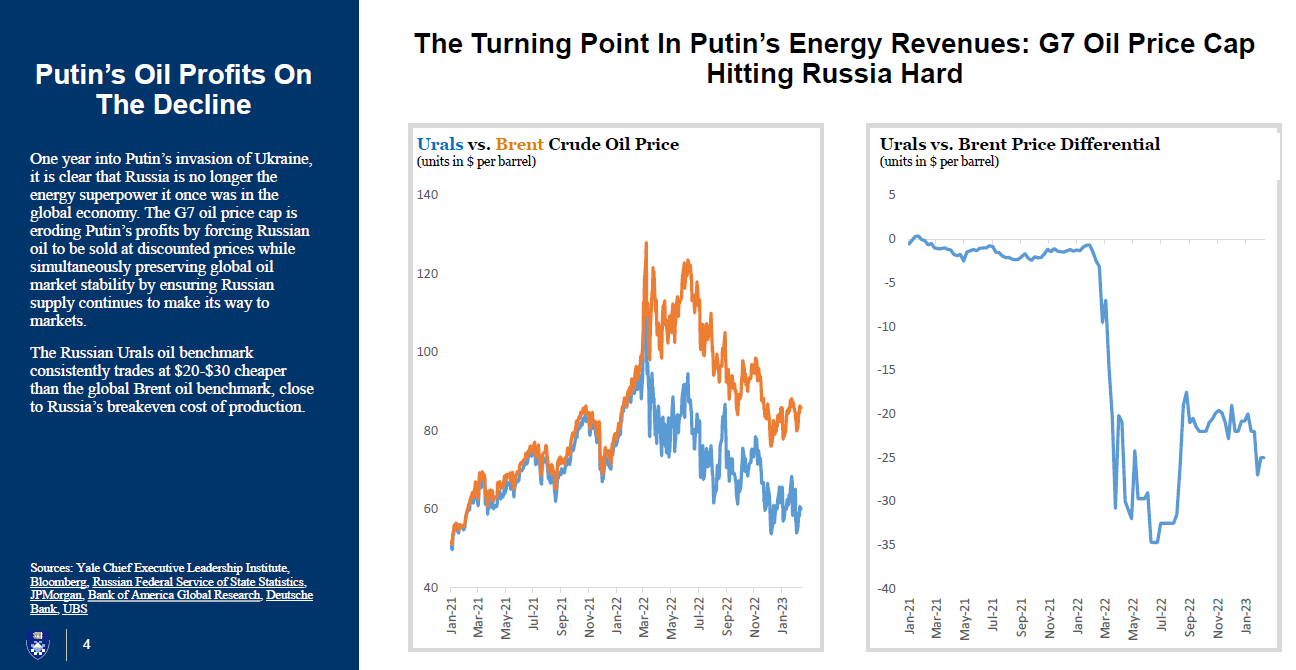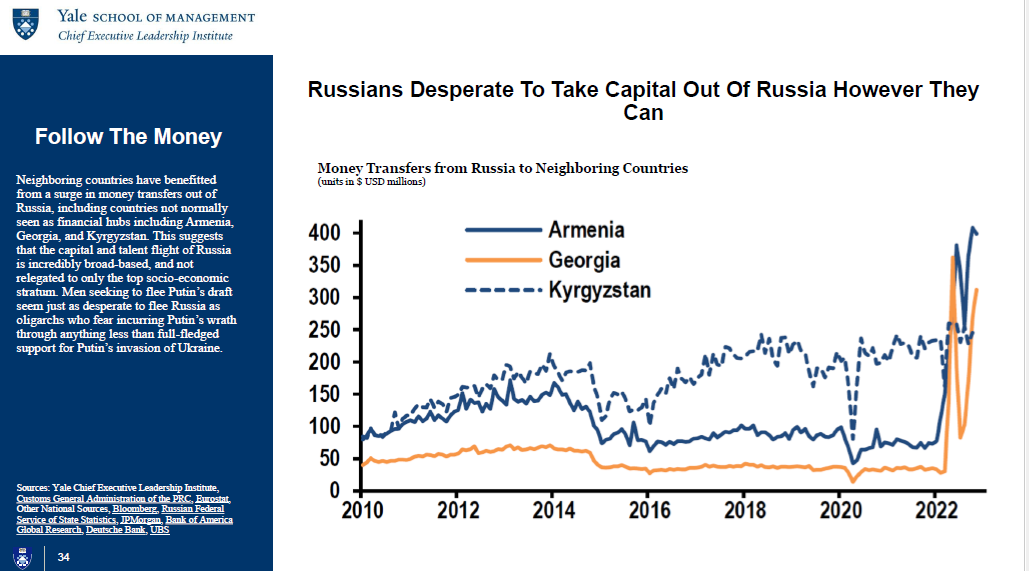Steven Tian is research director of the Yale Chief Executive Leadership Institute. He previously worked in the U.S. State Department on Iranian nuclear nonproliferation in the Office of the Under Secretary.
It may have been considered cute in 2000 when 19-year-old pop star Britney Spears sang her faux apology song “Oops I Did It Again,” but when senior economists sing out deceit, no one thinks it is anything but dangerous. Today, the IMF economists did it again with a certification of Vladmir Putin’s unsupported rosy economic forecasts, inexplicably doubling its forecast for Russian GDP growth, which at a projected 0.7% growth far exceeds that of much of Europe. The International Monetary Fund (IMF) has become a source of data distortion and policy confusion either as an unwittingly native tool of Putin’s propaganda machine due to incompetence and laziness, or perhaps something more sinister.
Consider the needless haze of confusion of the IMF’s colliding headlines: the AFP reports “IMF Raises Russian Growth Forecast On Deficit-fueled Government Spending”, while CNN more accurately reports “IMF: Ukraine war will have ‘devastating’ consequences for Russia’s economy.” So which is it?
Sadly, beneath the smoke and mirrors obfuscation, the IMF is doubling down on its own worst mistake. At the end of January 2023, the IMF recklessly made Russian projections in their World Economic Outlook which their economists admitted to us over the past year they simply do not have. They certified the fictional projections that Russia will avoid a recession in 2023 with an economy that would expand by 0.3% after shrinking by 2.2% in 2022 and would outstrip growth of the U.K. and Germany. Furthermore, as we have demonstrated, the IMF economists privately admit that they have no basis to make such projections as they have covertly given Russia a pass on their membership obligation to provide comprehensive, timely, transparent, and verifiable data to the IMF.
Since the Ukrainian invasion, our data has shown that the Kremlin’s economic releases have become increasingly cherry-picked, selectively tossing out unfavorable metrics while releasing only those that are more favorable. Concealed for the past year are such core statistics reported for decades which include: imports, exports, capital inflows and outflows, central bank monetary base data, air passenger travel, oil and gas monthly output data, lending origination data, and foreign direct investment. Few if any of the other 166 member nations of the IMF are excused for violating the membership’s data disclosure rules in such flagrant fashion.

Thus, the Russian GDP number is a pure invention from Putin’s imagination and the ruble is not an exchange traded currency. Therefore, Putin’s proclamations of resurgent value are again pure invention – never mind the fact the ruble has now fallen to weaker levels than pre-war. Putin has changed out the heads of his economic data unit Rosstat, until he found compliant sycophants to suspend the facts. The Putin-selected statistics are then recklessly trumpeted across the world media and relied upon by careless experts in constructing ludicrous forecasts which are unrealistically favorable to the Kremlin but are then repeated by naïve media and professional economists who wrongly think the IMF did their homework. We broke fresh ground last summer showing that the Russian economy was actually imploding because we went directly to Russia’s buyers or sellers and third party sources to uncover what Putin was concealing.
Read More: The U.N. Can’t Allow Russia to Take Over the Security Council
Just a month ago, with former Morgan Stanley chief economist Stephen Roach, we showed how the IMF was covering up this implosion of the Russian economy due to haste or deceit. Privately, the IMF’s Russian economist desk confided to us that they have “zero visibility” into the Russian economy: “We agree that there is massive uncertainty surrounding the future of the Russian economy, and hence doing a forecast could be seen as a ‘fool’s errand.'”
Alarmingly, an independent investigation by law firm Wilmer Hale found evidence that the IMF Managing Director Kristalina Georgieva may have been exerting political pressure on economists during her tenure at the World Bank to favor China.
Last month, the IMF justified their faulty GDP forecast by wrongly arguing that Russian oil volumes have remained resilient – but perhaps the IMF economists need a MBA as well as a PhD so they would have learned you cannot make up losses in the volume of sales. Russia is so inefficient a producer ($44/barrel to extract it and $12/barrel to ship it to Asia versus $22/bbl for Saudi Arabia) that it now selling at breakeven prices with the Urals (Russia) oil market price still below the $60 price cap imposed by the west – all while Russia and Saudi Arabia is forfeiting oil market share amidst hundreds of thousands of new barrels of production coming onboard from new producers such as Guyana, Norway, Kazakhstan, Brazil, and Nigeria.

Even beyond oil, energy which was 2/3 of Russia’s exports prior to the war have fallen by $500 million a day. This time last year, the E.U. drew almost half of its gas from Russia, with Russia sending almost 90 % of its production to the E.U. Now the E.U. buys almost all its gas in the form of liquefied nature gas (LNG from the U.S., Algeria, and Norway which is converted back to vapor in new German facilities and sent through pipelines). Russia, with only natural gas to sell, has no pipelines to China or India so most of Putin’s gas stays in the ground.
And outside of energy, major sectors of the Russian economy have fallen 60% to 95% from pre-war levels thanks in large part to the exodus of over 1,000 global multinational corporations from Russia, as we have painstakingly documented. The rest of the world now has terrific bumper crops in agriculture and new sources of metals, while Russians are fleeing by the millions including over 400,000 to Uzbekistan alone, according to the Uzbek Ambassador, bringing businesses and capital with them. In short, Russia is by no means an economic superpower and brings nothing to the global economy. Moscow based Wall Street Journal reporter Evan Gershkovich was abducted by Putin last month in part for revealing these truths in print.
This month, the IMF is now justifying their enhanced growth forecast under the guise of Russian deficit spending – though that spending is nothing but a mirage anchored in clouds. Russia has been frozen out of international debt markets so Putin is largely drawing down rainy day funds and raiding the coffers of companies to fund an unsustainable burst of government spending, most of it funding military expenditures. Cannibalizing the productive economy to fund war is not smart economic management worth celebrating. Putin is throwing in the living room furniture to keep the house warm. Putin survives merely off lies and cannibalization.
We are far from alone in our skepticism over Putin’s cherry-picked statistics, as scores of professional economists are alarmed by the IMF’s projections with significant media outcry. Many sanctions economists warn against using Putin wartime GDP forecasts since not only does the manufactured data hide dramatic economic contraction, but Russian GDP methodology is subject to constant and often unannounced changes and “recalculations”. As Agathe Demarais, global forecasting director at the Economist Intelligence Unit, warned last month, Russia’s numbers cannot be trusted: “The real problem is in Western countries: Experts and media quoting Russia’s recession figure should probably take the time to question their data instead of amplifying the Kremlin’s talking points.” Even Russian oligarchs such as aluminum tycoon Oleg Deripaska are openly fretting about how Putin will run out of cash next year–revealing how Putin has been cannibalizing the Russian economy to make ends meet temporarily at steep long-term cost – with Kremlin officials such as former Energy Minister Vladimir Milov conceding that the Russian economy is deteriorating.
At least Britney Spears can apologize when she gets it wrong but the IMF has yet to admit they’ve blown all their Russia forecasts since the invasion began. The governance of the IMF has to question the quality of their reports while professional economists and the media must acknowledge the IMF has badly damaged its credibility. Putin is losing the military war, the diplomatic war, and the economic war. He must not win the disinformation war by western media and policy makers naively falling for his fake economic data.
More Must-Reads from TIME
- Inside Elon Musk’s War on Washington
- Meet the 2025 Women of the Year
- The Harsh Truth About Disability Inclusion
- Why Do More Young Adults Have Cancer?
- Colman Domingo Leads With Radical Love
- How to Get Better at Doing Things Alone
- Cecily Strong on Goober the Clown
- Column: The Rise of America’s Broligarchy
Contact us at letters@time.com